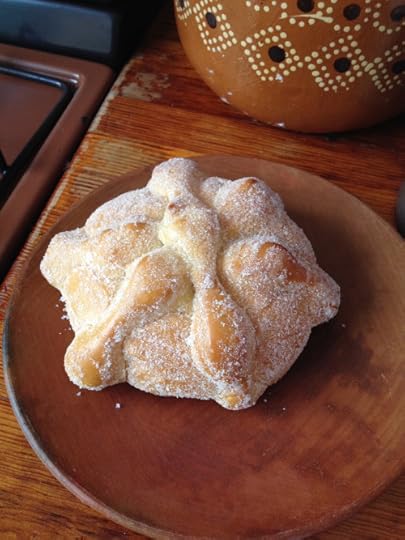The bread was the size of my breast, the size of my breast
when...

The bread was the size of my breast, the size of my breast
when I am laying on my back, the size of my breast when I am laying on my back
and a little heavier and a little younger. Larger loaves were the size of
curled up cats, but the smaller ones were the size of my breast and they filled
bins and were heaped on counters in all the bakeries and cafes. The sugar
crystals that fleck that top sparkled in the light, diamond dust, and dissolved
in the wet heat of the mouth. Pan de muerto. Death bread. Bread of the dead.
The loaves appear in bakeries and cafes in the lead-up to Dia de los Muertos.
The criss-crossing swells ontop are meant to be bones, skeletal swells, phalangeal.
They grip, they grope.
It tastes something like being young. Buttery, sugary, a
whisper of citrus, and some flavor hard to place. The subtle orange exists on a
plane less crude than taste, more in the nose than on the tongue, something to
be breathed in, not swallowed. The loaf, torn
open, has a milky smell, a calcium scent that speaks to the bones, a milky
citrusness that is almost sour. Who remembers the taste of mother’s milk? All
of us breastfed? That first taste imprints itself in the passageways of our
minds, a neural pattern strengthened over six months or more of lactal meals.
The memory exists somewhere, doesn’t it? At the furthest reaches of what we
know, it’s there, far away as the moon. Chaos fills up the space between, an
obstacle course to reach it. But maybe now and then a taste, a breath, launches
us to it, and we barely recognize what we’re being reminded of. It tastes something like being young.
The texture inside is porous, an airy web of dough,
tiny-holed. It looks like the inside of a bone. Or the inside of a bone looks
like a pastry, yeasty and air pocketed, a bready tangle. Our bones make our
blood. Is it why bread is the essential food of life? Because it’s twin to our
skeleton? Fingers grip the bun, the breast, a tender, desperate clutch. Is death grip the strength of death’s fist,
most powerful, always victorious? Or is it the grip we have on life, that
essential clutch, that resistance to letting go? Our fingers continue to clutch
even after death: you’ll have to pry that
from my cold dead hands. Hold on. Hold on. Bones break. We break bread. Pan
de muerto reminds us of the bones that belong to us, what’s left of those gone,
the bones we’ll someday be.



